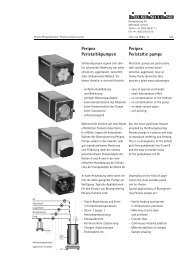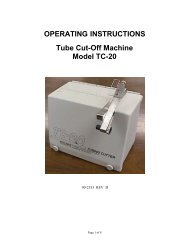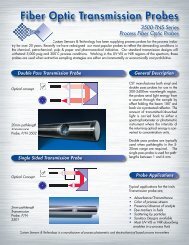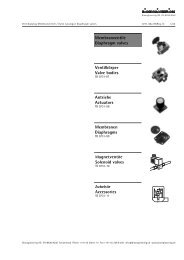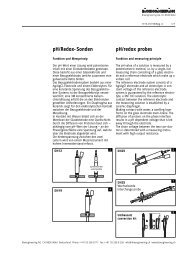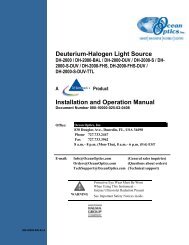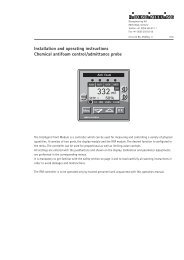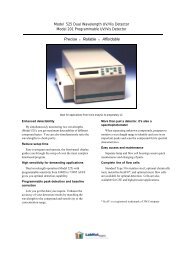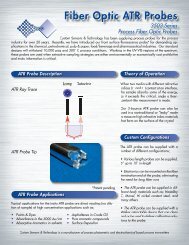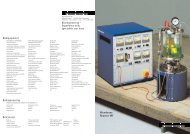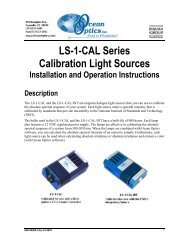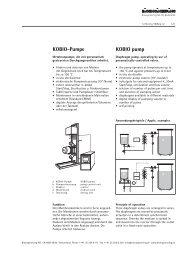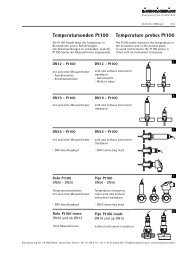OMNIDRIVER Brochure - Qas-inc.com
OMNIDRIVER Brochure - Qas-inc.com
OMNIDRIVER Brochure - Qas-inc.com
Create successful ePaper yourself
Turn your PDF publications into a flip-book with our unique Google optimized e-Paper software.
OmniDriver and SPAM<br />
More Than a Device Driver<br />
OmniDriver is a software driver package for Windows, Mac OSX and Linux operating systems that allows you<br />
to easily write custom software solutions for your Ocean Optics USB spectrometers and direct-attach devices.<br />
OmniDriver takes the best of our software driver packages and allows you to harness the power of highspeed<br />
data acquisition in a single cross-platform driver. Integrate OmniDriver into your own software application<br />
for <strong>com</strong>plete control over USB spectrometers and devices in virtually any OS environment.<br />
What’s more, our Spectral Processing<br />
and Manipulation (SPAM) module<br />
performs all spectral processing math<br />
from subtracting dark to radiometric<br />
color analysis. SPAM provides you<br />
with the ability to harness spectral<br />
processing <strong>com</strong>mands for your own<br />
applications but does not require you<br />
to use Ocean Optics spectrometers or<br />
hardware. SPAM is available as a<br />
stand-alone module or as part of the<br />
OmniDriver package (OMNI+SPAM).<br />
Developed in Java TM<br />
OmniDriver was created in the Java<br />
environment and <strong>inc</strong>ludes native<br />
libraries for select Windows, Mac OSX<br />
and Linux operating systems. Using<br />
OmniDriver, you can develop robust<br />
applications to control multiple Ocean<br />
Optics USB spectrometers and<br />
direct-attach devices across these<br />
different operating systems. Ocean<br />
Optics is the first and only provider in<br />
the optical sensing industry to offer<br />
this level of cross-platform <strong>com</strong>patibility.<br />
Example OmniDriver Code for LabVIEW<br />
Resulting Spectrum of USB4000 with LS-1 Light Source<br />
p. +1 727.733.2447 f. +1 727.733.3962 www.OceanOptics.<strong>com</strong> Info@oceanoptics.<strong>com</strong>
Complete Platform & Device Independence<br />
Applications written in Java are environment-independent; they can work across all operating systems. This is a<br />
very advantageous feature for product developers and OEMs wanting to expand their product offering with<br />
systems that work on multiple operating platforms. In developing OmniDriver, we took the Java philosophy a<br />
step further to create a device driver that is not only platform-independent, but also spectrometer-independent;<br />
the same Java code works with all Ocean Optics USB spectrometers and direct-attach devices.<br />
Example of C++ code in Microsoft Visual Studio<br />
“I don’t know how to<br />
program in Java”<br />
No problem! If you know how to program in C, C++, Visual<br />
Basic, or one of many Microsoft Office applications, you<br />
can use OmniDriver. Our wrapper libraries take care of<br />
the Java code; we provide Framework (Mac OSX),<br />
Dynamic Link Library (Windows), Shared Object (Linux)<br />
and a .NET object (Windows). Get a taste of the power<br />
of OminiDriver, and see examples of our code at:<br />
www.oceanoptics.<strong>com</strong>/products/omnidriver.asp
OmniDriver Features<br />
What does it take to make such a robust driver?<br />
High-res Timing: Time stamping that is accurate to<br />
sub-microsecond performance; great for chemical<br />
kinetics and other applications that require <strong>com</strong>plex<br />
time accountability.<br />
LabView Support: OmniDriver version 7.1 and<br />
above provides drivers for LabVIEW to enable you to<br />
configure Ocean Optics spectrometers as real-time<br />
virtual instruments in National Instruments' LabVIEW<br />
graphical programming environment.<br />
Support for Ocean Optics USB Spectrometers<br />
and Direct-attach Devices:<br />
• USB2000*<br />
• USB2000-FLG*<br />
• USB2000+<br />
• USB4000<br />
• HR2000*<br />
• HR2000+<br />
• HR4000<br />
• QE65000<br />
* Discontinued Products<br />
Support is Coming Soon for Our Latest<br />
Spectrometers:<br />
• Jaz<br />
• Maya2000<br />
• Maya2000 Pro<br />
• NIR256<br />
• NIR512<br />
• Red Tide (USB650)<br />
• ADC1000-USB<br />
(<strong>inc</strong>ludes Deep Well)<br />
• MMS-Raman*<br />
• Curie*<br />
Measurement Corrections:<br />
• Detector nonlinearity<br />
• Electrical dark (automatic baseline removal)<br />
• Stray light<br />
• Boxcar smoothing (averaging across pixels)<br />
• Averaging multiple scans<br />
Control of the Following Extended Functions<br />
(Depending on Spectrometer Model):<br />
• Strobe-enabled<br />
• Thermo-electric cooling (TEC), and reading<br />
detector and PCB temperatures<br />
• Analog input for the supported spectrometers<br />
(voltage only)<br />
• Gated fluorescence mode<br />
• Analog output (4-20 mA current output for LS-450<br />
and soon the AOUT; voltage out for HR4000)<br />
• Digital (TTL) input/output (control of GPIO pins)<br />
• Setting external trigger modes<br />
• Reading out wavelength calibration<br />
• Setting single and continuous strobe delays<br />
Operating System Support:<br />
Windows: Windows XP, NT, and 2000<br />
(Vista and 64-bit <strong>com</strong>ing soon)<br />
Mac: OSX 10.3 or later<br />
Linux: Many x86 distributions are supported<br />
Kernel 2.4.20 and libusb 0.1.10 or later<br />
are required<br />
Wrapper wrapper;<br />
DoubleArray wavelengths;<br />
DoubleArray sampleSpectrum;<br />
DoubleArray darkSpectrum;<br />
DoubleArray referenceSpectrum;<br />
DoubleArray processedSpectrum;<br />
CoreAbsorbance absorbance;<br />
double *values, *wls;<br />
int i;<br />
wrapper.openAllSpectrometers();<br />
wavelengths = wrapper.getWavelengths(0);<br />
/* Get dark spectrum */<br />
darkSpectrum = wrapper.getScan(0);<br />
/* Get reference spectrum */<br />
referenceSpectrum = wrapper.getScan(0);<br />
/* Get sample spectrum */<br />
sampleSpectrum = wrapper.getScan(0);<br />
/* Do absorbance calculation */<br />
processedSpectrum = absorbance.processSpectrum(darkSpectrum,<br />
referenceSpectum, sampleSpectrum);<br />
/* Print out absorbance values */<br />
values = processedSpectrum.getDoubleValues();<br />
wls = wavelengths.getDoubleValues();<br />
for(i = 0; i < processedSpectrum.getLength(); i++) {<br />
printf("Wavelength: %1.2f, absorbance: %1.3f\n", wls[i],<br />
values[i]);<br />
}<br />
wrapper.closeSpectrometer(0);<br />
Example of absorbance<br />
measurement in C++<br />
NOTE: OmniDriver does NOT support PCI or ISA products.
SPAM Features<br />
Powerful tools for processing your spectral data<br />
A Robust Set of Functions:<br />
• Scope mode<br />
• Scope minus dark<br />
• Absorbance<br />
• Transmission<br />
• Reflection<br />
• Relative irradiance (with user-specified<br />
color temperature)<br />
• Raman (with user-specified wavelength)<br />
• Blackbody and CIE Relative daylight<br />
spectrum generators with user-defined<br />
color temperature<br />
• Peak finding and metrics (centroid, full<br />
width at half max in units of pixels and<br />
wavelengths, center wavelength, integral,<br />
pixel number, 90% enclosing width)<br />
Choice of Measurement Units:<br />
• Nanometers<br />
• Microns<br />
• Píxel number<br />
• Gigahertz<br />
• Wave numbers<br />
• Raman shifts<br />
SPAM Corrections:<br />
• Nonunity reference<br />
• Reference monitoring<br />
Coming soon to SPAM:<br />
• Linear regressions<br />
• Matrix math<br />
• Linear and cubic splines<br />
Spectral Calculations:<br />
• Absolute irradiance<br />
• New calibration from lamp files<br />
• Photometry<br />
• Lumens<br />
• Lux<br />
• Candela<br />
• Luminance<br />
• µJoule<br />
• µWatt<br />
• µJoule/cm2<br />
• µWatt/cm2<br />
• dBm<br />
• Photons/cm2<br />
• Total photons<br />
• Moles of photons<br />
• Electron volts<br />
• Color<br />
• CIE 1931 & CIE 1965 observers<br />
• Energy, power, photons (integrated over a range, or as a spectrum)<br />
• CIE Illuminants A, B, C, D50, D55, D65, D75, E (unity), F1-F12<br />
• Reflective and emissive color<br />
• Emissive color can use relative or absolute irradiance<br />
• Photosynthetic Active Response (PAR)<br />
• CIE XYZ<br />
• x, y, z<br />
• Color spaces<br />
• Color Rendering Index (CRI)<br />
• General CRI Ra<br />
• Special CRI R1- R14<br />
• Correlated Color Temperature (CCT)<br />
• Dominant wavelength and purity<br />
• u’v’w’, u,v hue angle, u,v saturation<br />
• CIE Whiteness and Tint<br />
• CIELAB (L*a*b*, hue angle, chroma)<br />
• CIE 1960 u,v<br />
• Hunter Lab



